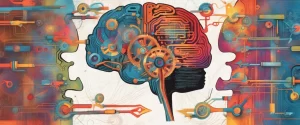
In an era of rapid advancements and unprecedented global challenges, the quest for knowledge and understanding has become more crucial than ever. Books have long served as a gateway to new insights and fresh perspectives, offering readers the opportunity to expand their horizons and deepen their understanding of the world. Among the vast array of literary works, two influential books have garnered significant attention in recent years: “Factfulness” by Hans Rosling and “A Whole New Mind” by Daniel H. Pink.
Both Rosling and Pink explore the complexities of our modern society and dissect the shifting dynamics that shape our personal and professional lives. While each book encapsulates a distinct area of inquiry, they share a common aim – to equip readers with the necessary tools to navigate the ever-changing landscape and empower them to make informed decisions. As we delve into these two thought-provoking works, it becomes apparent that their authors, in their own unique ways, strive to dismantle conventional thinking and present a refreshing outlook on the world we live in.
In “Factfulness,” Hans Rosling, a renowned statistician and global health expert, delves deep into the human tendency to overlook progress and focus on negativity. Through a data-driven approach, Rosling challenges the prevailing pessimistic narratives by highlighting global improvements in health, education, and living standards. By dissecting misconceptions and exposing our unconscious biases, Rosling urges readers to adopt a fact-based worldview that shatters prevailing myths and compels us to embrace a more optimistic perspective.
On the other hand, Daniel H. Pink, in “A Whole New Mind,” embarks on an exploration of the skills and aptitudes needed to thrive in the rapidly evolving terrain of the twenty-first century. Pink argues that a seismic shift is underway, valuing right-brain thinking attributes such as creativity, empathy, and intuition alongside traditional left-brain capabilities. Through persuasive anecdotes and compelling evidence, Pink discusses the significance of developing a holistic mindset that embraces both hemispheres of the brain, ultimately enabling readers to adapt and flourish in an increasingly conceptual economy.
While “Factfulness” and “A Whole New Mind” may initially appear to address distinct subjects, they converge in their embodiment of intellectual curiosity and their pursuit of a more balanced, nuanced understanding of the world. Together, these books offer readers an expansive perspective that encourages critical analysis, challenges preconceived notions, and facilitates personal growth. By comparing and contrasting the insights presented in both works, we aim to shed light on the diverse dimensions of our complex reality and ultimately discern a path towards a more enlightened future.
In this comparative study, we will explore the core themes, methodologies, and implications of “Factfulness” and “A Whole New Mind.” Through a comprehensive analysis of the authors’ arguments, supported by individual experiences and verifiable data, we aim to discern the key takeaways from each book, their potential synergies, and their respective impacts on our comprehension of an increasingly interconnected world. By unveiling the profound insights offered by Rosling and Pink, we strive to traverse the intellectual frontier and illuminate new horizons of understanding that will shape our personal and professional lives moving forward.
Brief Summary of Two Books
Factfulness by Hans Rosling
Factfulness by Hans Rosling is a thought-provoking book that challenges common misconceptions and biases about the state of the world. Rosling, a renowned statistician and global health expert, delves into ten instinctive biases that hinder us from seeing the world as it truly is. Through clear data and engaging storytelling, he paints a more accurate picture of the world’s progress and emphasizes the importance of basing our understanding on facts and evidence.
Rosling starts by discrediting the notion that the world is divided into two distinct groups, such as “developed” and “developing” nations, and instead introduces a framework of four income levels to better represent global realities. He then debunks the idea that the world is overpopulated, explaining how population growth is actually slowing down and will likely stabilize in the future.
The book also challenges the assumption that the majority of people live in extreme poverty, highlighting the significant progress made in reducing global poverty rates. Rosling outlines how economic development, education, and access to opportunities have contributed to lifting millions out of poverty.
Another key point in the book is the misconception that the world is becoming more dangerous. With real data, Rosling demonstrates that many forms of violence, such as war and terrorism, have decreased over time, and that the media often distorts our perception of safety.
Factfulness also addresses the fear and pessimism surrounding environmental issues, offering a more nuanced understanding of the challenges we face. Rosling argues that technological advancements and human ingenuity can lead to sustainable solutions, expressing optimism about our ability to tackle global problems.
In summary, Factfulness exposes the major gaps between our perception of the world and the actual reality. It compels readers to critically evaluate their own biases and encourages a more fact-based, optimistic view of the world, helping us become more informed and compassionate global citizens.
A Whole New Mind by Daniel H. Pink
“A Whole New Mind” by Daniel H. Pink is a non-fiction book that explores the crucial role of right-brain thinking in the evolving world. Pink suggests that as society advances, left-brain dominant skills such as logical reasoning and analysis are becoming less valuable. In contrast, right-brain abilities like creativity, empathy, and holistic thinking are gaining in importance. The author argues that in order to thrive in the future, individuals need to develop their right-brain aptitudes alongside their left-brain skills. Pink presents six essential aptitudes – design, story, symphony, empathy, play, and meaning – providing practical examples and exercises to help readers enhance these areas in their lives and work. Overall, the book emphasizes the need for a balance between the logical and creative mind, encouraging readers to embrace their right-brain potential to prosper in a rapidly changing world.
Comparison between Two Books

Similarities in Decision Making
Both Factfulness by Hans Rosling and A Whole New Mind by Daniel H. Pink explore the topic of decision making in their own unique ways. Although they take different approaches, there are several similarities in how both authors emphasize the importance of informed decision making.
1. Rationality and objectivity: Both books emphasize the importance of making decisions based on rationality and objectivity rather than relying on biases or preconceived notions. They argue for the need to challenge our own assumptions and make decisions based on facts and evidence rather than personal beliefs.
2. Data-driven decision making: Both books emphasize the significance of data and statistics in decision making. Rosling argues in Factfulness that using factual data to understand the world can lead to more accurate decision making. Pink, in A Whole New Mind, encourages readers to develop their analytical skills to process and interpret data effectively.
3. Contextual understanding: Both authors stress the importance of considering the broader context when making decisions. Rosling emphasizes the need to understand global trends and the larger picture to make informed decisions, while Pink focuses on the importance of empathy and understanding the emotional and social context of a decision.
4. Long-term perspective: Both books encourage readers to adopt a long-term perspective when it comes to decision making. Rosling argues that it is essential to consider trends and long-term data to make sustainable decisions. Similarly, Pink highlights the significance of considering the future impacts of decisions in order to make choices that align with long-term goals.
5. Embracing uncertainty: Both authors acknowledge the inherent uncertainty in decision making. Rosling argues that we should acknowledge uncertainty while still striving for accurate decisions, and Pink emphasizes the need to embrace ambiguity and navigate the grey areas in decision making.
While Factfulness primarily focuses on decision making with a global perspective, A Whole New Mind explores decision making in the context of creativity and design thinking. Nonetheless, the similarities in their approach to informed decision making highlight its universal importance across different domains.
Divergences in Decision Making
Factfulness by Hans Rosling and A Whole New Mind by Daniel H. Pink are both highly popular non-fiction books that offer unique perspectives on understanding the world and making informed decisions. While they share similarities in promoting critical thinking and challenging common assumptions, there are key divergences in their approaches to decision making.
1. Factfulness focuses on data-driven decision making: Hans Rosling, a prominent statistician, emphasizes the importance of relying on accurate data and evidence-based thinking. He argues that our worldview is often distorted due to biases and instinctive thinking patterns. Rosling promotes the use of data analysis to make more informed decisions, highlighting the significance of looking at trends, percentages, and larger patterns. His book encourages readers to rely on factual information and challenge their preconceived ideas.
2. A Whole New Mind highlights the importance of holistic decision making: Daniel H. Pink takes a broader approach to decision making, suggesting that successful decision making requires both analytical and creative thinking. Pink argues that in today’s world, where many routine tasks can be automated, it is essential to cultivate right-brain skills such as empathy, creativity, and adaptability. His book emphasizes the significance of incorporating emotional intelligence and intuition alongside analytics to make well-rounded decisions.
3. Factfulness focuses on dispelling biases and misconceptions: Rosling’s book primarily aims to correct cognitive biases that hinder effective decision making. He focuses on addressing common misconceptions and myths that shape our worldview. By presenting facts and challenging popular narratives, Rosling encourages readers to make decisions based on objective reality rather than personal biases or anecdotal evidence.
4. A Whole New Mind emphasizes the importance of purpose-driven decision making: Pink’s book explores how decision making can be enhanced by finding deeper meaning and linking personal values to actions. He argues that purpose-driven decisions not only create a sense of fulfillment but also lead to better outcomes. Pink encourages readers to be guided by their passions, values, and purpose when making decisions, suggesting that aligning decisions with personal meaning can lead to more holistic and fulfilled lives.
In conclusion, the divergence in decision making approaches between Factfulness and A Whole New Mind lies in the focus on data-driven decision making versus a holistic, purpose-driven approach. While Rosling advocates for fact-based decision making free from biases, Pink emphasizes the importance of combining analytical and intuitive thinking, as well as aligning decision making with personal values and purpose. Both books provide valuable insights into decision making, catering to readers who prefer a more evidence-based or holistic approach to navigate the complexities of the world.

Conclusion
Both Factfulness by Hans Rosling and A Whole New Mind by Daniel H. Pink are highly acclaimed books that offer valuable insights. The choice between the two ultimately depends on an individual’s personal interests and goals. Here are some key points about each book to help you make an informed decision:
1. Factfulness by Hans Rosling:
– Rosling, a renowned global health expert, challenges our preconceived notions about the world’s progress and highlights the importance of data-driven thinking.
– The book emphasizes the need to base our opinions on facts and data rather than biases or outdated information.
– Rosling’s optimistic approach provides a refreshing perspective on global issues, debunking many commonly held misconceptions about poverty, education, and population growth.
– Factfulness is a must-read for those seeking a better understanding of the world and our biases, while also learning to think critically and rationally.
2. A Whole New Mind by Daniel H. Pink:
– Pink explores the significant shift in our economy from the Information Age to the Conceptual Age, where right-brain thinking skills such as creativity and empathy are becoming increasingly valuable.
– The book argues that individuals can enhance their personal and professional lives by developing a balanced approach that combines both analytical and creative skills.
– Pink provides practical advice on how to cultivate essential abilities like design thinking, story-telling, and empathy, which are becoming vital in a world driven by automation and artificial intelligence.
– A Whole New Mind is an excellent choice for individuals looking to thrive in the changing landscape of work by harnessing their creative abilities.
Ultimately, both books offer unique perspectives and valuable insights. If you are interested in gaining a better understanding of the world and challenging your own biases, Factfulness by Hans Rosling is an excellent choice. However, if you are looking to adapt to the changing demands of the future and enhance your creative thinking skills, A Whole New Mind by Daniel H. Pink might be more suitable.


